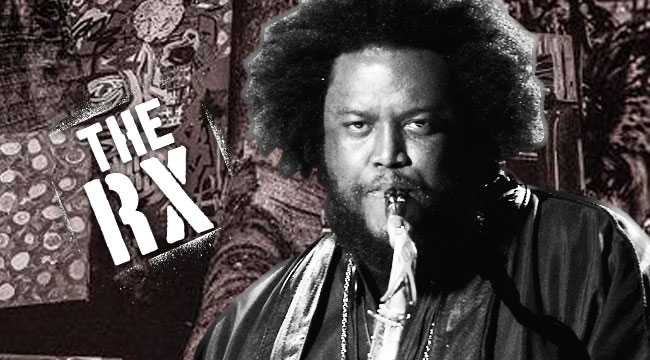
Normally, when you get a song stuck in your head, it’s due to a catchy melody or a hooky pop chorus that just worms its way into the back of your brain, popping up every few minutes so that you catch yourself humming a few bars or muttering the handful of lyrics that you can remember ad nauseum for as many days as it takes hold. Sometimes you love it — okay, most times, but you pretend to hate it, because that’s what we do in the era of social media-encouraged snark. But what do you do when an artist’s whole album is that one line, that four bars of music, or simply a wordless aria that inhabits your spirit?
That’s the question I’ve been grappling with over the brassy through-line of Harmony Of Difference the engaging, daring new suite from jazz revivalist Kamasi Washington, which, to be clear, is only the best problem to have. You hear it in the first song, “Desire” as a typically “jazzy” blend of piano and horns, low-tempo, swaying softly in a smoky lounge. By the sixth and final track, “Truth,” it has metamorphosed into a swooping, heroic blast of adventure movie music, soaring choral vocals have been added, the tempo has picked up, and Washington has lost all pretense of restraint, tearing into his saxophone solo like a starved tiger after a haunch of lamb.
Jazz has always been my thing, but it’s odd to say after twenty-some years of listening to the likes of Miles Davis, Herbie Hancock, Thelonius Monk, John Coltrane, Quincy Jones, and Grover Washington Jr., I have never heard anything like Harmony Of Difference. It’s evocative in a way that none of my previous favorites have ever been. Jazz, for me, was always background music in a way — throw it on, set a mood, commence to whatever activity prompted the evening’s selection and just vibe out.
Sure, there’s an appreciation of the technicality, musicianship, and at times, virtuoso involved in the composition, arrangement, and especially the improvisation involved. There’s a complex calculus that goes into every musical decision, but it’s never been my interest to try and dissect the reasoning behind them. I’ve been entertained, but in a sort of disengaged way that allows me to set my internal autopilot to a task without being distracted.
But Kamasi Washington refuses to play the background. Forget distracted — I was arrested the moment I heard the compositions from Harmony Of Difference at the Hollywood Bowl last month. The horn motif that wraps and twines through and around the six-song suite just will not leave me alone — not that I would ever want it to.
Perhaps it’s because it permutates into so many intriguingly familiar yet disparate variations of itself throughout. The chilled-out version from “Desire” becomes almost a ballad in “Knowledge,” sweeping into an almost-romantic mood, a midnight balcony under a starry sky. Washington’s sax here is muted, mumbling, whispering sweet nothings, before picking up into a declaration of its presence, then fading back into a relaxed slumber, before returning on “Truth” as its final form, brassy and bold and swaggering.
In between the signature horn section’s appearances, tracks like “Humility,” “Perspective,” and “Integrity” play with the motif, not quite following the same melody, but still dancing around it, evoking its presence, like a glimpse through the trees out of the corner of one’s eye. “Integrity” especially teases out a new framework for it, couching it in Latin rhythms, with Brazilian cuíca glimmering subtly behind the more traditionally “jazz” instruments.
But in the end, it’s “Truth” I really can’t leave behind. Simply put, it is one of the most beautiful and emotive compositions of the last five years. It’s no wonder that Washington has been so heralded in critical circles. In a recent interview, he praised Compton rapper Kendrick Lamar’s To Pimp A Butterfly, opining that, “It just didn’t change the music. It changed the audience,” and that “it meant that intellectually stimulating music doesn’t have to be underground. It can be mainstream.” It’s fitting that Washington himself was a critical piece of Butterfly‘s musical puzzle; Harmony proves that Kamasi is just as visionary, just as genius and just as world-shaking all on his own. The truth is, he hasn’t changed jazz at all; he’s changed the way we listen to it.
Harmony Of Difference is out now through Young Turks. You can listen to it at Kamasi Washington’s official website.






